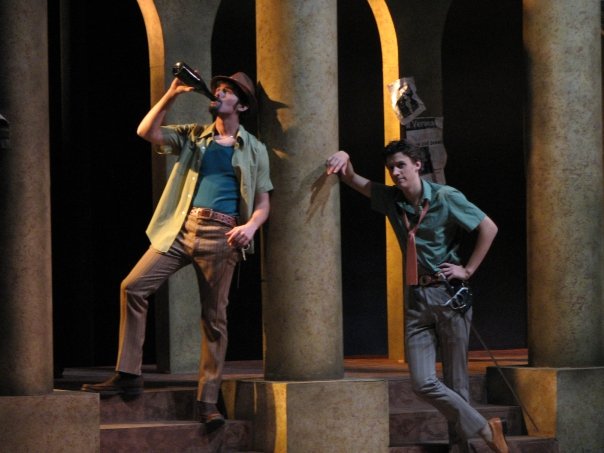I never enjoy productions of Romeo & Juliet that play the Tragedy from the beginning – probably because I don’t think it is a Tragedy at all (see here). But even if it were, this isn’t Hamlet or Macbeth. There’s no ghost, no three witches. The first half of the show is really, really funny. If you play the Tragic elements of the show from the get-go, the show becomes a dirge. Whereas if you play it as written, as an Italian Comedy, it moves right along.
 Wait, you ask. What about the Prologue?
Wait, you ask. What about the Prologue?
Screw the Prologue, say I.
I don’t care how famous it is. I think the famous Prologue is tacked on, a later addition. It doesn’t appear in the First Folio. In the earliest texts we have, the show begins with two guys walking down the street talking about sex and violence: I will push Montague’s men from the wall, and thrust his maids to the wall. The Prologue only serves to make the audience brace themselves, hold themselves in emotional reserve.
Read the Prologue again:
Two households, both alike in dignity,
In fair Verona, where we lay our scene,
From ancient grudge break to new mutiny,
Where civil blood makes civil hands unclean.
From forth the fatal loins of these two foes
A pair of star-cross’d lovers take their life;
Whose misadventured piteous overthrows
Do with their death bury their parents’ strife.
The fearful passage of their death-mark’d love,
And the continuance of their parents’ rage,
Which, but their children’s end, nought could remove,
Is now the two hours’ traffic of our stage;
The which if you with patient ears attend,
What here shall miss, our toil shall strive to mend.
What the hell? Telling everyone at the top what the end is going to be? No self-respecting playwright would do such a thing! Shakespeare was a big believer in the old maxim Show, Don’t Tell. It can’t be there to explain the feud, because that’s explored right off the bat by Sampson and Gregory. It can’t be there to establish the location, because the Prince says Verona several times in his opening speech.
No, the only vital purpose the Prologue serves is as a disclaimer, a warning: Don’t laugh too much, folks, because they’re gonna die. See you at the end!
Shakespeare didn’t think much of Prologues. The only other times I can think of that he used them was in Troilus & Cressida, where he was aping the Greek style, and in Henry V, where he was making a political statement at the top of each act.
Why use it in R&J, then? Because this show could have gotten him lynched. Imagine if the disclaimer wasn’t there. The audience is laughing at the nurse, smiling at the familiar banter of the lovers, enjoying the light-hearted swordplay. Then, snap, someone’s dead. Then another person is dead. Then weeping and wailing and gnashing of teeth. Then, oh look, they’re going to be fine – what, they’re dead?!
So the Prologue is a warning to the audience to keep the players from being beaten to death after the show by an angry mob. The author of the Prologue even felt the need to repeat it! Just before the balcony scene the Prologue returns to remind everyone:
Now old desire doth in his death-bed lie,
And young affection gapes to be his heir;
That fair for which love groan’d for and would die,
With tender Juliet match’d, is now not fair.
Now Romeo is beloved and loves again,
Alike bewitched by the charm of looks,
But to his foe supposed he must complain,
And she steal love’s sweet bait from fearful hooks:
Being held a foe, he may not have access
To breathe such vows as lovers use to swear;
And she as much in love, her means much less
To meet her new-beloved any where:
But passion lends them power, time means, to meet
Tempering extremities with extreme sweet.
Death-bed? Gapes? Bewitched? Not the most romantic of language. Glad you’re enjoying the show, folks, but they’re still gonna snuff it! But enjoy watching them hook up, and see you at the end!
Which is why I cut the Prologue whenever I direct the show. It serves no useful purpose, gives no information we don’t get elsewhere, and undercuts the power of the story right out the gate.

